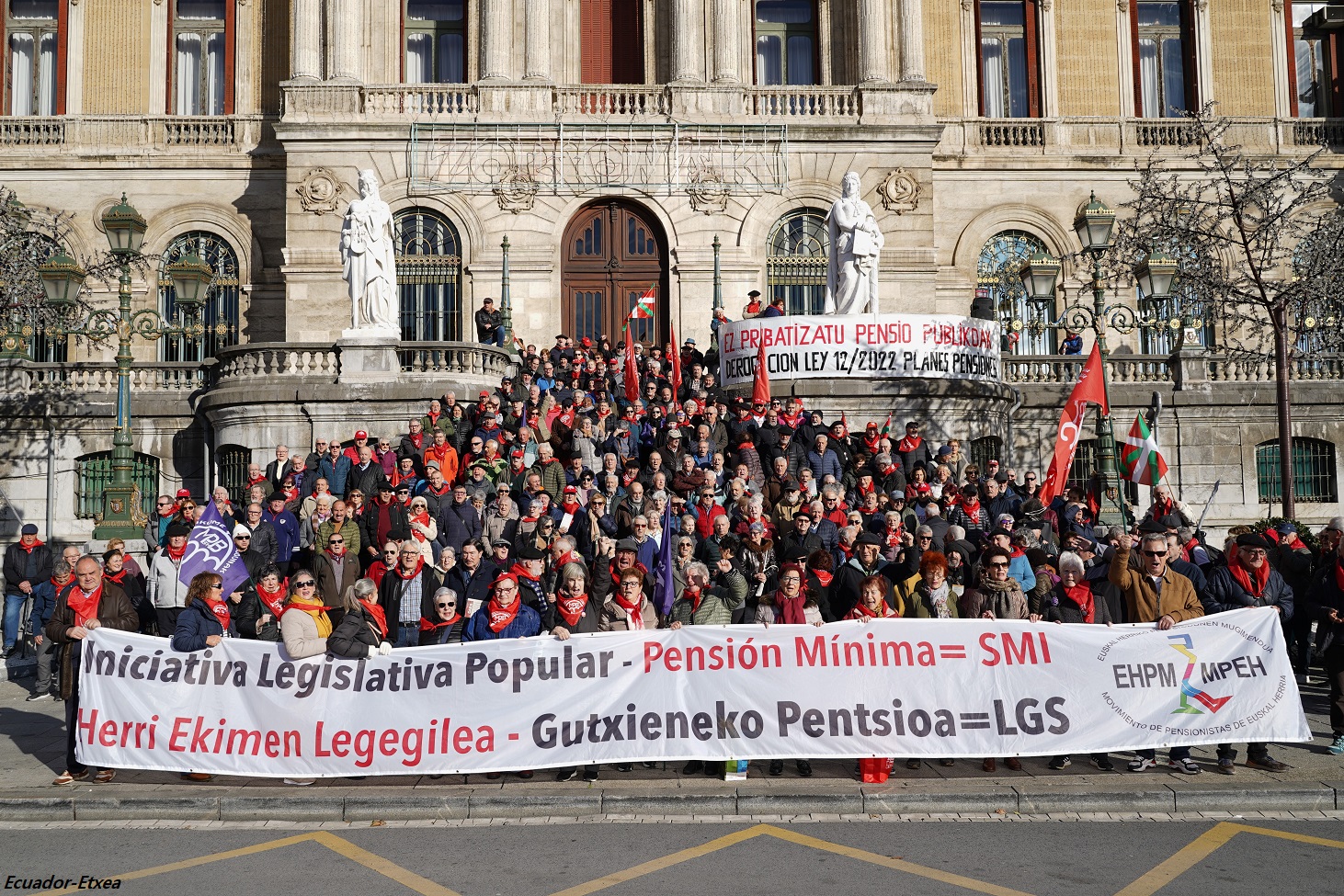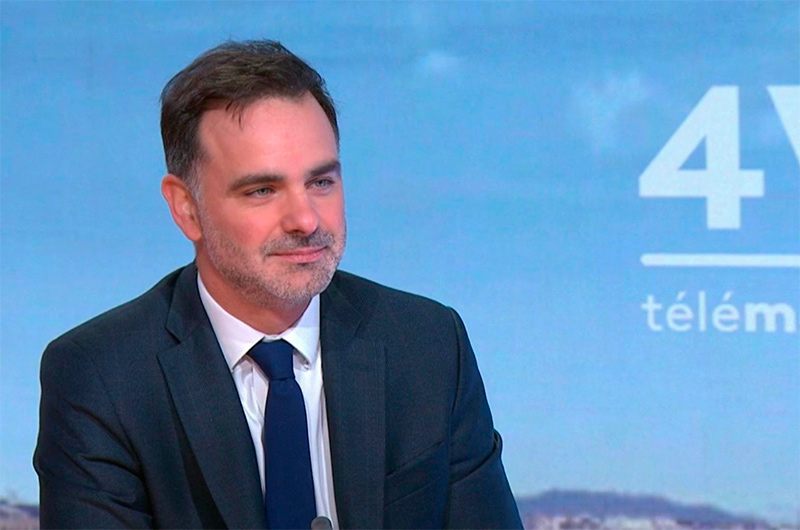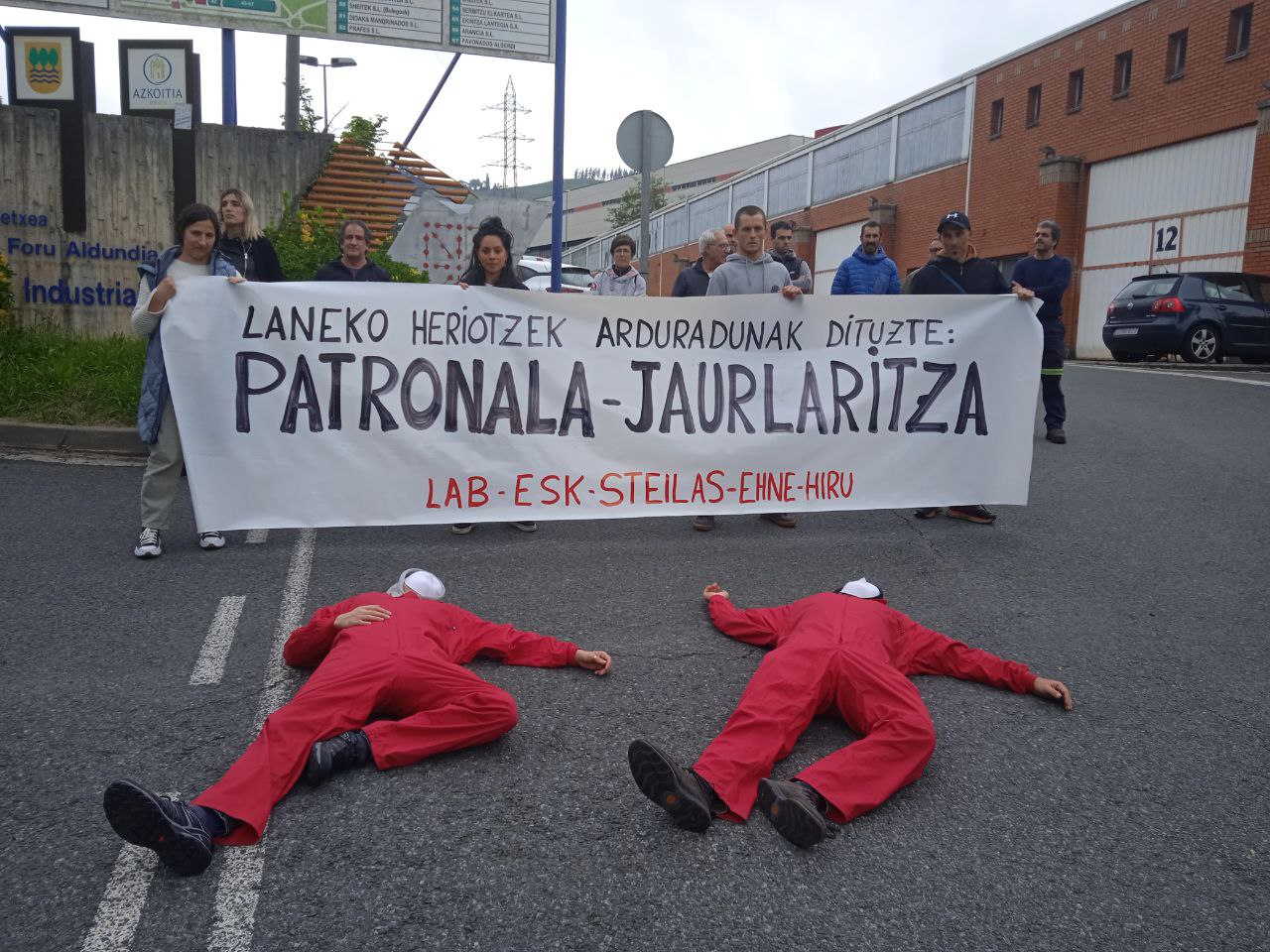Society
Environment
Politics
Economy
Culture
Basque language
Feminism
Education
International
Opinion
wednesday 19 february 2025
Automatically translated from Basque, translation may contain errors. More information here. 
Retrets: the fire in the last barricade of workers’ rights
- In three years since the coup, the European working class has gone from proclaiming a 35-hour workweek to losing rights that seemed untouchable through 60 years of struggle. The jubilees are an example of this. There is no way for states to resist improvised policies to overcome the financial crisis, except in old France.

Fermin Goiriz bati hartu diogu irudia Pantin es distinto blogetik. Alderdi Obrero Independentearen afixek "Ez hunki gure erretretak!" diote lau hizkuntzetan idatzita. "Frantzia, Grezia, Espainia, Portugal... aldarrikapen bera" ipini diote aurretik, nahiz eta begi bistakoa den Grezian eta Frantzian bai izan direla mobilizazio gogorrak erreforma ultraliberalak gelditzeko helburuz, baina ez dela berdin gertatu orain arte Espainian eta Portugalen. Agian urrunegi iritsi da Nicolas Sarkozy bere planetan? "Erretretena gerta dakioke "“idatzi du Fréderic Lordonek"“ gehiegizko urratsa, agian pilatu zaizkio erreforma lotsagabearekiko jendearen arbuioa, finantzen munduak erakutsi espektakuluarekiko nazka izugarria, ez kapitalismoaren beraren baina bai gaur dauzkan formen kontrako protesta eta bizimodu baten defentsa". Hitz jokoa eginez, Frantziak erreforma baino iraultza behar duela.
What can the Basque-Spanish journalist say about the greatest wave of strikes and mobilizations that France has seen since May 1968? Knowing that they will be remembered in the 2020 news with the titles “Ten years ago...”, it is difficult for him to understand why they have mobilized so much in the Hexagon than in England or Spain, where they have to suffer even more bitter setbacks.
In the Southern Basque Country and in Spain in general, the main donors, whether left-wing or mostly right-wing, follow neoliberal orthodoxy in their analyses.
An Antton Pérez Calleja mocked the mobilizations of the French workers in the following way: “I’m having a lot of fun with what’s going on in France because of the retirements. The present is not a struggle between the Chinese and the wicked, in which the people oppose absolute evil, against absorbing capitalism. It's not the same in this. The system administrator, the State, is warning in horror that the accounts do not come out. It requires assets to work more, to charge less to liabilities. We need to balance the equation.”
Leftist readings have been much more abundant in France. In case of choosing one among the opinion makers who have justified or explained the rebellion in the streets, Frédéric Lordon, who animates La pompe à phynance (Financial Punp) in the blogs section of Le Monde Diplomatique, has published an article entitled “The melting point of Retret”. Long, complicated, but with a strong argument that clarifies what many workers have long suspected: that the last and perhaps most important of the deceptions of many years is what the authorities have organized with the retirements.
As part of an overwhelming policy of deregulation, says Lordon, the government speaks to two very different communities. On the one hand there is the community of citizens that make up the nation, and on the other hand there is the community that makes up the finances of the world. And as its arbitrator, the State “gives these second forces reason against the first.” This is the new
situation that has led to the globalization of finance: “We thought that the sovereign people was the only community reference of the state (...) but we have seen that the authorities do not mandate for the citizens who have given them legitimacy, but for others.” In other words, in order for the world’s “markets” not to deprive the State’s debt of the AAA category (Lordon summarizes “la retraite contre la triple A”), it is said that citizens’ pensions must be changed immediately.
The French parliament has publicly approved a reform, but under the apparent change a much deeper move is taking place. That is, what in French is called retraite par capitalisation and in Spanish individual capitalization of pensions. It is a system that has spread in all of the last decades, to a lesser or greater extent, if the jubilee that must be collected from public money is to be completed.
Pension systems that many people on the left still consider to be an advance among us, in Lordon’s opinion, leave workers imprisoned in the arms of those who manage their savings. In the past, the public pension system has been allowed to deteriorate after having previously allowed railways, postal services, health or care services, etc. to deteriorate and be privatized.
Since the objective of social services was the partial distribution of a country’s wealth, and consequently its well-being, privatization has over the years derailed this achievement, deepening the class divide.
The “reformers” have acted with the psychology of the people in the task of demolishing the welfare state. I mean, with individualism. “Everyone takes care of their own, each one immersed in his own calculations, who has no choice but to surrender to the system, each one accepts what he puts at his disposal.” This is what has happened to anyone with private pension plans, for Lordon: as a miserable retirement has been announced to him, he has often swallowed his principles and introduced some coins into any pension plan.
On the other hand, the nefarious results of the private system that is now being established here in the United States are being seen. Lordon cites the results of the study conducted by Robert Novy-Marx and Joshua Rauh for the National Bureau of Economic Research. They seem to show that most U.S. pension funds, including the public, have lost money over the years.
As pension funds have made risky bets trying to profit from where or where, they have suffered the bursts of all the bubbles, from the one on the Internet to the one that was torn apart by the collapse of the subprimes. But caught in the whirlwind of speculation in the world of finance, lobbies paid for by these funds have put pressure on Washington, and finally President Obama himself has overturned the law decided in 2006 under George Bush to guarantee pension capacity.
As a result, says Lordon, “it is predicted that many U.S. workers will have no choice but to continue working in Methuselah until the age of (if possible, of course).” How much of
the rumors that have spread over the years have not contributed to the goal of generalizing private pensions? At the head of everything, mutuals, etc. that pay for propaganda – those that are part of the financial system – will always charge their commissions, whether they win or lose pension funds.
Trapped in savings plans like this, the worker has a hard time showing his teeth to the financial system. On the other hand, in many of the restructuring operations that have proliferated around the world, this type of funds are making investments... and leaving thousands of workers on the streets. The funds supposedly owned by the workers throwing the other workers into the mixeria in the neighboring village.
Another thermometer to predict the reactions of workers imprisoned by the new system has recently been the aftermath of the pollution caused by the oil company BP in the Gulf of Mexico. Due to the high cost of cleaning up and compensation, BP’s shares fell sharply on the London Stock Exchange, where Footsie is one of the pillars of the index. Millions of British pensioners and retirees have been walking through the months as badly as they were angry at how they were losing their savings.
At the forefront of everything, with this plan, one of the identity documents of France and in part of a rich Europe has been put into question: the solidarity between generations with the retrets and the one that allowed part of the profits generated to be redistributed in old age. The bankers have drastically tightened the living conditions of the workers. The same goes for the old ones.
In the Southern Basque Country and in Spain in general, the main donors, whether left-wing or mostly right-wing, follow neoliberal orthodoxy in their analyses.
An Antton Pérez Calleja mocked the mobilizations of the French workers in the following way: “I’m having a lot of fun with what’s going on in France because of the retirements. The present is not a struggle between the Chinese and the wicked, in which the people oppose absolute evil, against absorbing capitalism. It's not the same in this. The system administrator, the State, is warning in horror that the accounts do not come out. It requires assets to work more, to charge less to liabilities. We need to balance the equation.”
Leftist readings have been much more abundant in France. In case of choosing one among the opinion makers who have justified or explained the rebellion in the streets, Frédéric Lordon, who animates La pompe à phynance (Financial Punp) in the blogs section of Le Monde Diplomatique, has published an article entitled “The melting point of Retret”. Long, complicated, but with a strong argument that clarifies what many workers have long suspected: that the last and perhaps most important of the deceptions of many years is what the authorities have organized with the retirements.
As part of an overwhelming policy of deregulation, says Lordon, the government speaks to two very different communities. On the one hand there is the community of citizens that make up the nation, and on the other hand there is the community that makes up the finances of the world. And as its arbitrator, the State “gives these second forces reason against the first.” This is the new
situation that has led to the globalization of finance: “We thought that the sovereign people was the only community reference of the state (...) but we have seen that the authorities do not mandate for the citizens who have given them legitimacy, but for others.” In other words, in order for the world’s “markets” not to deprive the State’s debt of the AAA category (Lordon summarizes “la retraite contre la triple A”), it is said that citizens’ pensions must be changed immediately.
The French parliament has publicly approved a reform, but under the apparent change a much deeper move is taking place. That is, what in French is called retraite par capitalisation and in Spanish individual capitalization of pensions. It is a system that has spread in all of the last decades, to a lesser or greater extent, if the jubilee that must be collected from public money is to be completed.
Pension systems that many people on the left still consider to be an advance among us, in Lordon’s opinion, leave workers imprisoned in the arms of those who manage their savings. In the past, the public pension system has been allowed to deteriorate after having previously allowed railways, postal services, health or care services, etc. to deteriorate and be privatized.
Our soss of old age
Since the objective of social services was the partial distribution of a country’s wealth, and consequently its well-being, privatization has over the years derailed this achievement, deepening the class divide.
The “reformers” have acted with the psychology of the people in the task of demolishing the welfare state. I mean, with individualism. “Everyone takes care of their own, each one immersed in his own calculations, who has no choice but to surrender to the system, each one accepts what he puts at his disposal.” This is what has happened to anyone with private pension plans, for Lordon: as a miserable retirement has been announced to him, he has often swallowed his principles and introduced some coins into any pension plan.
On the other hand, the nefarious results of the private system that is now being established here in the United States are being seen. Lordon cites the results of the study conducted by Robert Novy-Marx and Joshua Rauh for the National Bureau of Economic Research. They seem to show that most U.S. pension funds, including the public, have lost money over the years.
As pension funds have made risky bets trying to profit from where or where, they have suffered the bursts of all the bubbles, from the one on the Internet to the one that was torn apart by the collapse of the subprimes. But caught in the whirlwind of speculation in the world of finance, lobbies paid for by these funds have put pressure on Washington, and finally President Obama himself has overturned the law decided in 2006 under George Bush to guarantee pension capacity.
As a result, says Lordon, “it is predicted that many U.S. workers will have no choice but to continue working in Methuselah until the age of (if possible, of course).” How much of
the rumors that have spread over the years have not contributed to the goal of generalizing private pensions? At the head of everything, mutuals, etc. that pay for propaganda – those that are part of the financial system – will always charge their commissions, whether they win or lose pension funds.
Trapped in savings plans like this, the worker has a hard time showing his teeth to the financial system. On the other hand, in many of the restructuring operations that have proliferated around the world, this type of funds are making investments... and leaving thousands of workers on the streets. The funds supposedly owned by the workers throwing the other workers into the mixeria in the neighboring village.
Another thermometer to predict the reactions of workers imprisoned by the new system has recently been the aftermath of the pollution caused by the oil company BP in the Gulf of Mexico. Due to the high cost of cleaning up and compensation, BP’s shares fell sharply on the London Stock Exchange, where Footsie is one of the pillars of the index. Millions of British pensioners and retirees have been walking through the months as badly as they were angry at how they were losing their savings.
At the forefront of everything, with this plan, one of the identity documents of France and in part of a rich Europe has been put into question: the solidarity between generations with the retrets and the one that allowed part of the profits generated to be redistributed in old age. The bankers have drastically tightened the living conditions of the workers. The same goes for the old ones.
Most read
Using Matomo
#1
#2
Zigor Olabarria Oleaga
#3
#4
Haritz Pascual Garjon
|
Euskalerria irratia
You are interested in the channel: Pentsioak
2025-01-14
Gorka Peñagarikano Goikoetxea
Pensioners in the Basque Parliament will demand that their minimum income be equivalent to those of the SMI
The Pensioners' Movement of the Basque Country will present the popular legislative initiative in the House of Vitoria-Gasteiz. A deadline is given until 24 April to collect more signatures and all persons over the age of 18 registered in the three territories are invited: Araba,... [+]
2024-12-19
Gedar
In Europe, 13% of pensioners have to continue working
4.9% of new retirees have to reconcile the pension with some work in the Spanish state. In Estonia it is 55%.
2024-11-12
Jon Torner Zabala
Pensions will rise by 0.9% in Iparralde compared to the new year
Starting on 1 January, the French Government will increase pensions by 0.9% before its initial announcement, as it did not plan to raise pensions until July 2025 to save EUR 4 billion.
2024-08-29
Urko Apaolaza Avila
The delay in the retirement age does not compensate: we will die sooner and the state will lose money
According to a study carried out in the Spanish State, the delay in the retirement age has negative consequences, not only for the worker himself at risk of early death, but also for the public fund: It would have a social loss valued at EUR 8,564. "It does not compensate,"... [+]
2023-11-16
Estitxu Eizagirre
"In verses," I. Pensioners. Bertsolaris Competition
Call for every Monday to bring to the street the songs that go to the street
The Basque Pensioners' Movement has launched a special competition for bertsos: "In pension systems." Basques over 60 years of Euskal Herria and the diaspora have a deadline until Monday, January 15 to put bertsos on the street. They announce that the awards will be special and... [+]
2023-11-10
Ahotsa.info
€ 1080 Now the popular initiative calls to participate in the demonstration on Saturday
Now, by means of a press conference, the event will be held on Saturday at 17:30 from Plaza Baluarte. They also wanted to make a special appeal to Navarre women because "the gender gap in pensions is undeniable and therefore completing the minimum pension at EUR 1080 is a... [+]
They call for Navarre budget money to be allocated to a minimum pension of €1,080
In Navarre, 51,000 people have a pension of less than €1,080. 66% are women. The Government of Navarra is being called upon to take responsibility and to secure minimum pensions.
2023-08-22
Ilargi Manzanares
Pensioners mobilize at Bilbao holidays
Thousands of pensioners have taken to the streets on Monday, along with txistularis and comparsas, taking advantage of the impact of the Bilbao Big Week. Claims have been made as a minimum pension of EUR 1,080.
2023-07-06
Urko Apaolaza Avila
Retire at 72? Why the proposal of the Spanish business lobby has no grip
The Employers' Circle of Spain says that the way the public pension system does not fall bankrupt "within five years" is to extend the retirement age between 68 and 72 years. This lobby uses the same discourse as the extreme right in the United States and elsewhere.
2023-06-28
ARGIA
A mauletarra must testify before the court in connection with the protests against reform of the
The mauletano who was arrested at a demonstration against the reform of the retas must testify at the Baiona court next week. Several citizens express their solidarity: “Repression is accelerating the rise.”
2023-06-06
Jenofa Berhokoirigoin
Despite the reform of the reserves, the crowd reconvenes in Baiona
Today, in Iparralde, the fourteenth day of strike against the reform of the reserves is celebrated. The trade unions have convened a demonstration in about 250 cities in the French state.
2023-05-26
Ainhoa Etxaide Amorrortu
Late retirement and longer working hours
What is the thought of the small trace of the complaints made on 28 April and that their only succession is the continuous chain of accidents and deaths of workers. In Azkoitia, once again in construction, a 62-year-old worker dies in a very common and therefore avoidable... [+]
2023-05-22
Leire Rodriguez Garmendia
The Pensioners' Movement of the Basque Country will make three marches requesting a pension of €1,080
They left Bilbao and Bergara on Monday and Agurain on Tuesday. On Thursday, the three demonstrations will be held in Gasteiz.
2023-05-17
Joana Garcia Lera
Black Retirement
When grandparents were young, retirement was represented as a time to enjoy life. Period of collection of the fruits of the work carried out during these years. What a satisfaction! It is a pity that young people today are never able to feel. You might think I'm a pessimist, but... [+]
2023-05-04
Jenofa Berhokoirigoin
The French Constitutional Council rejects the referendum on reform
On 8 June they have the next option to overturn the law that has gone from 62 to 64 years. In fact, on that day they will vote on the bill proposed by the independent group Liot to annul the law. The unions have set the fourteenth day of strike for 6 June.
Eguneraketa berriak daude






















